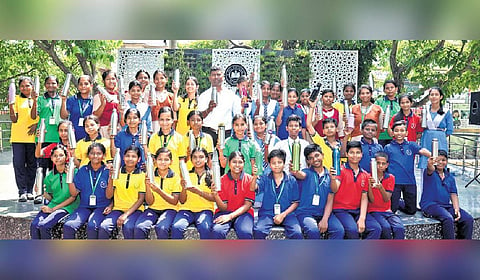

BHUBANESWAR: A casual visit to the Government High School at IRC village, located in the heart of the city, reveals a remarkable journey of transformation. The school that turned smart with digital classrooms last year, has now taken another major leap - embracing the zero waste concept to shape environmentally conscious citizens of tomorrow.
In the classrooms, plastic bottles have been replaced by steel. There are designated waste segregation bins where children are taught to dispose of waste through colour-coded containers - green for wet waste, blue for recyclable items like paper and plastic and red for electronic or hazardous waste including battery and glass. The students also follow a strict routine during the mid-day meal (MDM) - avoiding food wastage, with the objective of maintaining hygiene and respecting food and resources.
“Within five months of this practice, more than half of our 2,000 odd students have stopped using plastic bottles. They are also using separate bins for trash and keeping their classrooms clean,” said school head master Pradipta Kumar Behera.
Behera said practising zero-waste was also of much significance for them as a majority of students, who are from the nearby settlements, will replicate the practice in their surroundings. “The zero waste is not just a practice, it’s a mindset. We are proud to be among the first few schools to follow this concept,” he said.
The thought process is not limited to the IRC Village school alone. The Bhubaneswar Municipal Corporation (BMC), which has introduced this waste-management concept at school-level, has started providing handholding and technical support to around 20 schools to transform them as ‘zero waste’ schools.
BMC first launched the initiative at Government High School at Laxmi Sagar in November last year and in a span of five months, it has transformed at least 10 government run schools into waste-free campuses. These include Government High Schools at Unit-VI, Saheed Nagar, Capital High School, Government Girls High School at Unit-IX, Government Boys High School at Unit-IX and Patia Girls High School, among others.
Municipal Commissioner Rajesh Prabhakar Patil said they launched the initiative in these schools to instill the importance of waste management in children from an early age and make them understand why it matters and how a person or a small institute can make a difference. “These values, when embedded in the subconscious during childhood, guide the behaviour naturally, like avoiding single-use plastics or not littering,” Patil said.
“It’s crucial that the next generation understands the issue of waste management from the right perspective and gets to know the solutions for it. Through this journey, they will become familiar with concepts like reduce, reuse, recycle (RRR), and the circular economy, helping them build a strong foundation for sustainable thinking,” he added.
The civic body has roped in Aasara Social Foundation to conduct training and awareness building among the teachers and students for implementation of the concept. With guidance from BMC and Aasara, the schools have initiated efforts to ban single use plastic and promote creative and innovative methods of waste reuse that includes training on ‘Waste-to-Art’.
Practice of converting fruit peels into liquid fertiliser for their use in kitchen gardens and turning flower waste from festivals to incense sticks has been adopted in some schools to teach students how the waste can be upcycled meaningfully. Some schools have committees involving students for waste management in the classrooms and campuses.
BMC assistant commissioner for Citizens Engagement and Sustainable Cell N Ganesh Babu said the civic body is also in the process of setting up on-campus compost pits in these schools where organic waste, food scraps and garden leaves will be collected and converted into manure. The initiative will help students to understand the decomposition process and also reinforce the idea of closing the waste loop within the campus itself.
“These sustainable habits in young minds, will also help us prepare a generation that will value and protect the environment,” he said, emphasising that the programme aligns with the broader ‘zero waste city mission’ of Bhubaneswar ensuring educational institutions actively contribute to the city’s sustainable vision. The BMC plans to seek more funds from the government for implementation of the concept.